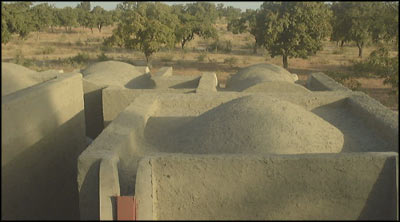
Developing local capacity to meet settlement and shelter
needs in the deteriorating environment of Northern Burkina Faso.
The north of Burkina Faso is numbered amongst the poorest regions of the world,
with remote towns and a relatively dense population in small scattered villages
living from pastoral and subsistence agriculture. A high proportion of men
have habitually migrated seasonally to the coastal countries to the south
to find work, and the risks and social consequences are far reaching, with
women often carrying an excessive burden of work previously shared with men.
Finding ways to keep families and family structure intact is an important
issue and one that has a direct link to the way people build and maintain
their homes.
DWF began work in Burkina Faso in 1995 with training activities in the centre and north of the country. In the northern provinces of Soum and Oudalan DWF had trained 50 woodless construction builders up to 2002 with support from the Danish and Burkina Faso Red Cross in the context of an environmental education programme. The pilot programme in Soum and Oudalan confirmed popular demand for woodless construction techniques. But the number of builders remained insufficient to develop a market for woodless construction or respond to local demand. As such, the core capacity that had developed was at risk of being dissipated. A greater number of builders needed to be trained and made available to the population in the towns and villages of these two provinces so that the market can develop.
DWF activities in Burkina FasoWith a new programme started in 2003 DWF develops partnerships with the community in Djibo and Gorom Gorom and their surrounding villages and with their representatives. Key partners in the project are local builders drawn from existing youth groups and local associations who become the carriers of skills into the community as a result of the training they receive. Workshops with members of the community ensure that the skills that developed are adapted to the needs of the community and individual families. The skills of the trainees are developed through training programmes and subsequent site work - house construction or collectives facilities - paid for by local clients with a contribution from the project to demonstration activities that covers the cost of the trainees and which contributes to developing the demand for trainees skills.
In Burkina Faso DWF is supported by Danida (Danish international development
aid) and DFID, the UK department for International Development.
![]() Woodless
Construction in Burkina Faso | download
| Partners | 1998
World Habitat Award
Woodless
Construction in Burkina Faso | download
| Partners | 1998
World Habitat Award
